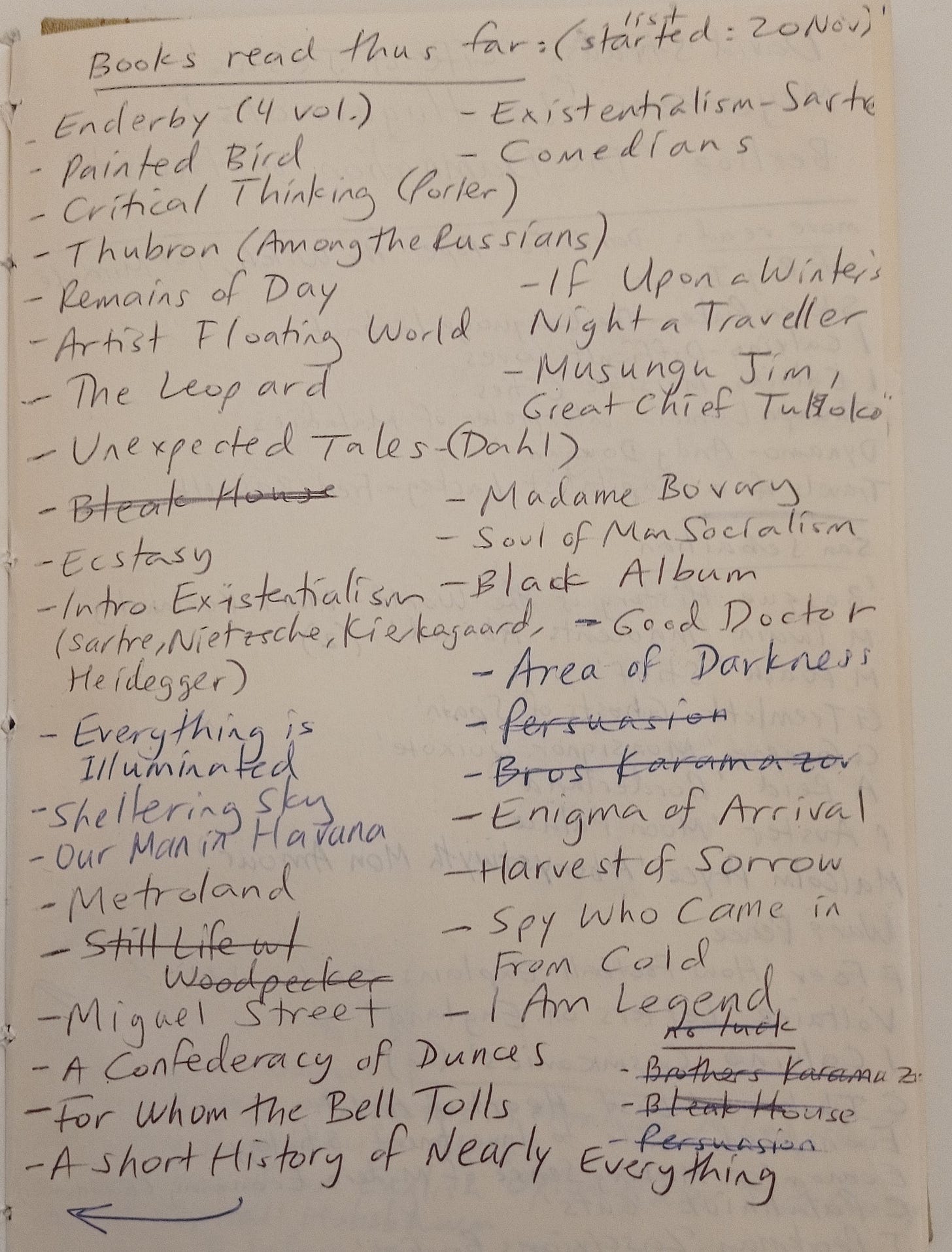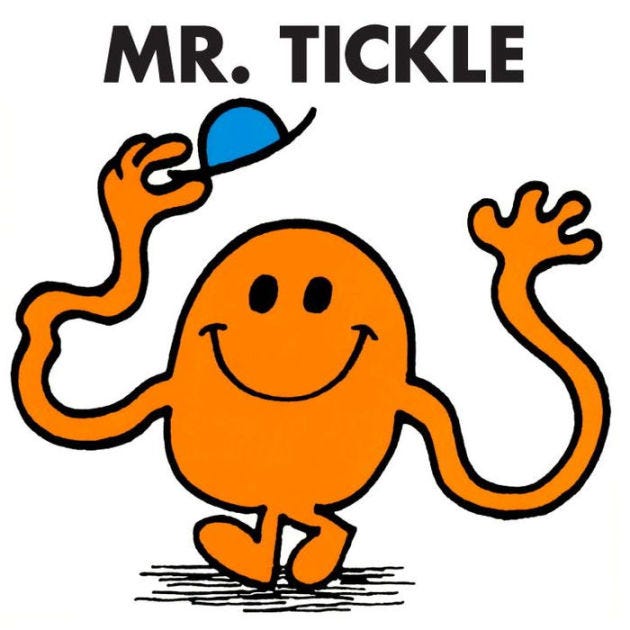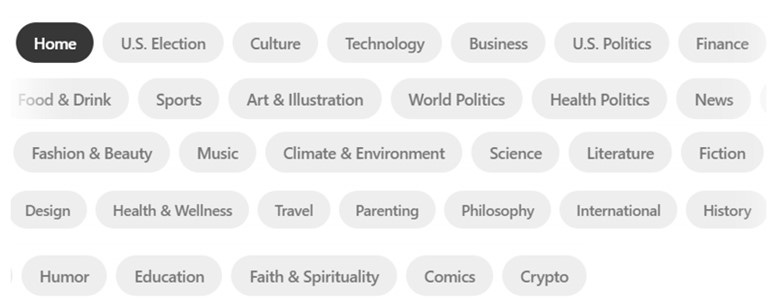F**k the algorithms
The most interesting discoveries are often the least expected
September 2005, Lviv, Ukraine
It was the start of my nine months in Lviv. These were the pre-ebook, pre-smartphone days. My ancient museum of a flat had no internet. I arrived with 4 or 5 books. Maybe 6. There were very few English books in town. Amazon didn’t deliver to Ukraine then (and they still don’t now). My books would last me a month, tops.
In her excellent book, Ex-Libris: Confessions of a Common Reader, Anne Fadiman relates how she was once so desperate for material that she read a 1974 Toyota Corolla car manual.
In this Guardian interview, amateur historian and presenter Philomena Cunk was asked the following question:1
What other books have you read?
“I thought Mr Tickle was interesting, because it’s one of the few books that really deals – in a very mature way – with the issues surrounding biscuits. And I liked reading the instructions to my Beko washing machine, because otherwise I’d have had no idea how the 30C cycle ended. And I hate not knowing how things end. Spoiler alert: it ends with a beep and a light going off.”
I hoped it would never come to that.
What was I to do?
Thank goodness for the British Council library.2 It was small and had a limited selection, but beggars can’t be choosers. Still, after a cursory glance at the books, where I spotted some Anthony Burgess, Graham Greene and VS Naipaul, my first thought was, ‘oh no, there aren’t that many books here I want to read.’
That ended up being one of the most enjoyable reading periods of my life. I did cheat a bit when I had my sister bring me a few books at Christmas, but otherwise I got by just fine with what was on offer (that’s my journal page at the start of this post).
October 2002, Edinburgh
I was a late bloomer when it came to intellectual curiosity. Though I was an avid reader through childhood and right up until I finished high school, once I got to university at Tufts I barely read for pleasure, and I probably squandered too many opportunities for broadening my scholarly horizons (interpret that euphemism however you like). A year or two after university I started subscribing to the Economist once I realised it was about far more than economics, and read it cover to cover. I don’t want this to turn into an “Ode to the Economist”, but I was suddenly fascinated by things I never would have expected, from West African politics to the ins-and-outs of emerging market debt restructuring to book reviews on macrophage therapies. That’s also when I became enraptured by their obituary column, which was always a treat (that sounds so morbid, but I’ve waxed lyrical ad nauseam about the beauty and art form of obituaries over the years).
Once I got to Edinburgh for my Masters, I replaced the Economist with the Guardian, primarily because of the cost and availability. It was something like 35p every day from the student union. In the year or so before Edinburgh, I would skive at work in my very important banking job in Boston (haha) by reading the Guardian and the Times online, but at Edinburgh, I limited myself to the left leaning literati, and I’d get my occasional dose of what other newspapers had to say to keep myself balanced. For example, when travelling, I’d read the Telegraph (primarily because you got a free bottle of water when doing so, and times are tough when you’re a student; very tenuous pun intended).
(I should also point out that my girlfriend at the time despised the Economist, other than the obituary column. We used to play a game each week of ‘guess who the obituary would be.’ It wasn’t always a well-known figure, like Maggie Smith for example, who is almost guaranteed to be in this week’s Economist, so we would each say something like ‘southern African socialist politician’, ‘Polish or Lithuanian botanist’ or ‘female Latin American novelist’. If we guessed the actual name, that was a bonus point. People think I’m nuts when I share this, but come on, there have to be other people playing this game, right? Right?)
Again though, the most important lesson to take from this - I devoured that newspaper every day, and the Saturday Review was the real treat: book reviews, cultural commentary, poetry, art. I learnt so much, my curiosity was insatiable, there was such a wide world of fascinating stuff. Who knew?
Two years later, when my girlfriend and I were in Nigeria, we found two-week old Economists from time to time (try taking that sentence out of context), but otherwise I would read Nigerian newspapers inside out. They were pretty much dominated by three topics: Nigerian domestic politics, agony aunt columns (where husbands would write in complaining that their wives weren’t washing their clothes properly); and the most in-depth English premier league football news you’ll ever find.
I quickly became an expert on the Nigerian political scene, though I can’t say I’ve retained all that much two decades later.
October 2024
Fast forward to the present. Most of us are reading online. People aren’t reading newspapers cover to cover. Very few of us are in a situation like that I faced in Lviv nearly 20 years ago. There are some exceptions, sure, but…
This is dangerous. We’re limiting ourselves.
Or rather I should not-so-modestly say (or assume): you’re limiting yourselves.
The more I learn about algorithms, the more concerned I get. That is why I feel the urge to say, f**k the algorithm!
You know what I mean. We’re stuck in our filter bubbles. The suggested articles that populate our feeds are being determined by what we’ve clicked on before. There’s a reason you’re seeing the same endless capybara rescue stories. It’s no accident that you keep getting fed Meghan Markle gossip. You’ve got to game the algorithm if you want to expand your horizons and discover unexpected treats.
I’m not immune to this either. A quick scroll on my phone gives me way too many stories about ‘the best AI growth stock to buy now’, ‘the most walkable European cities’, ‘novels that transport you back in time’, ‘Radiohead as you’ve never seen them before!’, ‘a history of the dry martini’, ‘VAR is ruining football’ and ‘the top 7 one-hit wonder bands of the 80s (where there is always at least 1 band mentioned that forces you to throw your phone against the wall screaming “WTF, Simple Minds and the Motors were NOT one-hit wonders you numpties!!!”)3
Alright wiseass, how?
It’s not difficult, but honestly, there’s no pressure. You very well might be fine with what you’re doing. We’re all busy people, there’s little time left to discover new things. Maybe you’re not curious. Maybe you’re happy with what you’ve got. That’s fine. But there are so many unexplored possibilities, and you might surprise yourself.
This theme, of being a well-rounded polymath (yes, that’s a tautology), is something I’ve written about ad infinitum. In fact, it’s well worth revisiting this post, where I dive into the importance of reading beyond your field of expertise:
“It might sound crazy, but once you understand the basic principles of your profession, you might gain more expertise by reading around your field than within your field. Connecting dots between fields helps you uncover the most powerful forces that guide how the world works, which can be so much more important than a little new detail that’s specific to your profession. And if you look hard enough, there are so many dots to connect.” (my emphasis)
Morgan Housel, Little Ways the World Works
For the love of God, Daniel, HOW?!?!
Easy. Just click on different links. Go to the science and technology section (for example) of a website you read. Click on an article that sounds intriguing, the kind of thing you wouldn’t normally read. You’d be surprised how much you can learn about life from reading business and finance articles. Grab a physical newspaper or magazine the next time you see one. Ask someone for a book recommendation that’s outside your usual field of interest, and then search for it online.
I regularly go to Amazon (you can go wherever you like). I start clicking on the recommended books and opening new tabs on my browser, tab after tab. I right click on different tabs, opening more pages and more books. If someone recommends a book or an author, I put that name in to see what happens. It’s like a version of the Telephone game, whispering something in someone’s ear and by the time it gets around the room it’s turned into something completely different. By the time you open your tenth tab, you’ve gone from Jane Austen to Sally Rooney to Saki to Angela Carter to Barbara Pym to Umberto Eco to Italo Calvino to Salman Rushdie to Rabindranath Tagore, eventually ending up with William Dalrymple’s The Golden Road: How Ancient India Transformed the World.
Substack: a bounty of wondrous creations
I promise you that I am not on Substack’s payroll, tasked with promoting the site over and over, repeatedly, until you’re so sick of hearing about it that you want to throw up.4
But it really is a great place to beat the algorithm and open up new worlds of discovery. Look at all of these possibilities!
Seriously, if you can’t find anything interesting here, then…(I don’t know what to tell you)
There’s nothing boring in the world. It’s just that you might not know enough about it.
The writer and investor Paul Graham said something very wise:
“There's a second component of reading that many people don't realize exists: searching for the good books. There are a huge number of books and only a small percentage of them are really good, so reading means searching. Someone who tries to read but doesn't understand about the need to search will end up reading bad books, and will wonder why people who read a lot like to do something so boring.”
I am always happy to get new recommendations on what to read, even though my TBR list is already endless. If you recommend it, there’s a very good chance I will read it (unless it’s Sally Rooney or a self-help book, sorry).
One final time: f**k the algorithm!
Housekeeping
I’ve updated my page with new sections, which you can only see on the desktop version. Everything I write will still appear on the main page, you won’t miss a thing.
If you haven’t already, have a look at my newly updated About section, which I’m very proud of and is not pretentious at all.
Book news
I have just started writing my second book. It is not a sequel to A Classroom in Kyiv. It’s related to the theme of this post, targeted towards language learners and will be particularly useful for expanding your vocabulary in a plethora of new topics.
In the meantime, the ebook for A Classroom in Kyiv is now only $4.99 and is available worldwide. For the price of a measly flat white, you can get a whole lifetime of new knowledge and plenty of lousy jokes, and with the meagre royalties I get from each sale I can only afford an americano, but hey, I’m not complaining, I’m grateful for whatever I can get.
Let me know – have I missed any other ways of beating the algorithm? Any other tips?
And here’s an excellent book if you’d like to find out more:
Hello World: Being Human in the Age of Algorithms, Hannah Fry
One final f**k the algorithm tale, and this one might be the best
A good friend met his wife on a dating app. Well, they kind of ‘met’, but not really. They were using the same app but didn’t match. They were colleagues and neither was aware that the other was using this app. They eventually went out, hit it off and subsequently found out they had both been using the same app.
Need I say it again?
I highly recommend reading the full interview. It’s absolutely hilarious, I haven’t laughed so hard in a long time. I laughed even harder than when I was updating my About page for the umpteenth time.
I wasn’t teaching at the British Council at the time.
Actually, I’m not sure if the Motors were a one-hit wonder or not. I only know one of their songs, and it’s a damn good one: Airport
Hence the reason we use ad nauseam (people often ask, why are you using Latin, you pretentious buffoon?); and yes, I am well aware that I overuse it and ad infinitum, but it ought to be obvious why by now (please don’t answer that).





In a world of algorithms, we should be the anomaly; seek out diverse perspectives to enrich your understanding.
Btw: I usually “scare” my algorithm. I don’t save cookies, I renounce to that for my freedom (even if it takes me extra seconds to put my info).
I also go to random articles, videos, and searches. Back when I had Instagram, it thought I was both a person interested in knitting and NBA, grunge music and playing the flute in classical music. It thought I had NFTs and interest in basebol and singing classes and warm ups. This keeps it coming up with interesting things - not so personalized, broad enough to keep me living a real life where I encounter a bit of everything.